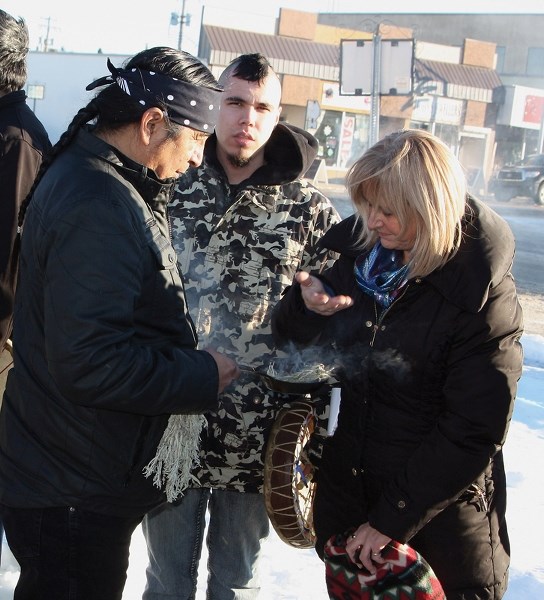About 35 people took part in a vigil on Thursday hosted by the Hope Resource Centre in Westlock to honour victims of violence.
The ceremony was held at the Georges L. Whissell Park in downtown Westlock. Sylvia Yoder, director of the Hope Resource Centre, said the vigil coincided with the end of the 16 Days of Activism Against Gender Violence, which begins Nov. 25 and encompasses the anniversary of the Montreal Massacre on Dec. 6.
That said, the vigil wasn’t specifically for female victims of violence alone. “I would say that the vigil was to take aside a portion of a day in a very busy month that’s all about seasonal mayhem and acknowledge what the impacts of violence are,” said Yoder.
She noted this was the third year they had held the ceremony and they wanted to give it a different spin this year. In particular, Yoder said they tried to make the ceremony more informal this time around.
Councillor Willard Alexis of the Alexis Nakota Sioux Nation began by burning a mixture of wheatgrass and sage as part of a cleansing ceremony for all those in attendance.
It continued with members of the Alexander First Nation and Alexis Nakoa Sioux Nation forming a drum circle and performing three songs. They were songs of prayer, thanks and honour for the women paid tribute by the ceremony, all sang in the Nakota language.
Noting she had just done some clinical training with the Alberta Fetal Alcohol Spectrum Disorder (FASD) network, Yoder said she has been in contact with the “very, very capable, trained people within (the Alexis and Alexander) reserves.”
“My intention was to ... share our skill sets back and forth,” she said.
“They were very interested in what I had to offer and invited me to visit them. And in turn, I was extremely interested in what they had to offer.
“I would say it was a culmination of a mutual attempt to support each other in a very, very shared cause.”
The group then headed to the Westlock United Church where lunch was served. Along one table were a row of candles and a listing of the bios of several women killed in acts of domestic violence.
Yoder said she felt it would have more impact for people to read the stories of women killed by violence rather than reciting them out.
The biographies of the women on display at the candle light vigil did not include any Aboriginal representation, but Yoder noted she had two individual clients this year who were Aboriginal and “almost murdered” by their partners. Both have been “significantly relocated,” she said.
“To be poor, to be indigenous and to be female is to be the most disadvantaged,” she said, quoting another source.
More commonly, Yoder said she believes a leading contributor to violence is poverty. She said breaking down the factors that contribute to violence is part of the Hope Resource Centre’s overall work.
“I believe that poverty is a huge, huge deterrent regardless of your cultural origin, which is why we (the Hope Resource Centre) are focusing more on economic supports. Because otherwise, there’s no alternatives.”
Ultimately, Yoder said she was touched by the attendance at the event, including the participation of the Alexander First Nation and Alexis Nakota Sioux Nation.
She said it went “much better than I expected” and hopes the event will grow into a “ripple of hope” across Canada.



